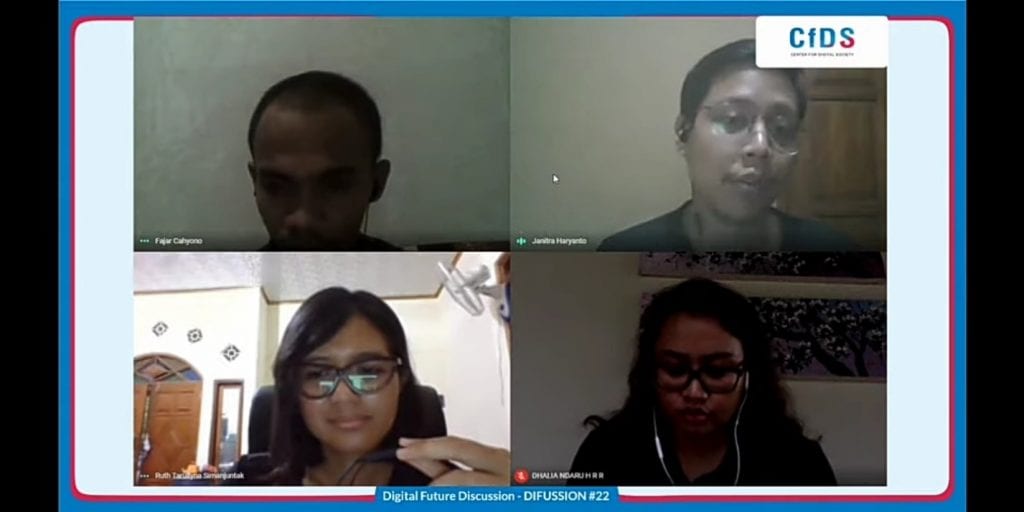
Yogyakarta, 17 April 2020—Center for Digital Society (CfDS) UGM held another routine discussion called Digital Future Discussion (Difussion) #22 on Friday evening (17/4). The discussion that broadcasted live through the channel YouTube of CfDS brought a theme ‘COVID-19: Technology, Data Privacy, and Infodemic’. Difussion #22 presented three speakers, they were Janitra Haryanto as the Project Officer of Research CfDS, and two Research Assistants of CfDS, they were Fajar Cahyono and Dhalia Ndaru, H. R. The discussion was moderated by Ruth Tarullyana Simanjuntak as the Staff of Event & Social Media CfDS and the discussion went on from 03.30 p.m. to 05.00 p.m.
The first speaker, Janitra Haryanto, brought the topic about the use of technology to halt the rate of pandemics COVID-19. Janitra explained how the countries in East Asia like South Korea, China, and Singapore used technology in their public policy to reduce the spread of pandemics COVID-19. Those three countries showed a good performance in facing this pandemics. South Korea’s policies include tracking applications, providing the information of locations that have been visited by the survivors, and providing informations about the affected locations of COVID-19.

Meanwhile in China, they tracked the potential contagion by using technology through WeChat, e-wallet records, CCTV, even drone. “China is very careful, there were even guards by the authorities like the police with smart helmets that can detect the subjects in public,” he said. In Singapore, they also use applications from the government to do the tracking and gave a chance for private company to develop it. On the other hand, the use of technology can pose a threat of privacy data security, especially in the authoritarian countries.
Fajar Cahyono, as the next speaker explained about the transparency of public information about COVID-19 positive patients. Patients’ data, according to the law, should not be shared, therefore it needs to be concerned how to protect the patients when the informations are opened. In Indonesia, there is potential for the survivors to be excommunicated, if the data related to name and address were shared. Fajar explained that, “Because of the emergency condition and the spreading scale is high, then the informations can be opened by keeping a close watch on what needs to be opened and not, like the name of patients and sub-districts are not important. As for history travel become the most important thing to be shared,”
The discussion was continued by the third speaker, Dhalia Ndaru, H.R. that brought the topic about the panic that happened during pandemics. Dhalia explained how panic buying happened in several countries like United States of America and Indonesia itself. Panic buying explained by stimulus-response theory, it explained how human responded the news of COVID-19 and it was the part of anxiousness. About the infodemic itself, it is the big amount of information flow with these interruptions that complicates the identification of a problem. It can caused the spread of misinformation, disinformation, and rumours. As for the ‘up to date’ culture in the society itself can trigger the panic. “Seeing friends shopping makes us feel that we should do the same with a sense of panic” Dhalia explained. To control panic buying, we could limit the search for information about COVID-19 according to what we need and pay attention to the credibility of the source. We also urged to obey the government recommendations and be wise in using social media.
Difussion #22 was closed with question and answer session that moderated by the moderator. The questions were collected from the comments section in the live chat column YouTube, then it answered by the related speaker. The discussion recording was uploaded in the YouTube channel of CfDS, so it can be watched again.
